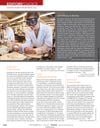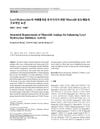 3 citations,
April 2018 in “Holzforschung”
3 citations,
April 2018 in “Holzforschung” Scientists found a new natural compound and other known compounds in Cercidiphyllum japonicum twigs, which might be useful for medicine.
 2 citations,
September 2023 in “Frontiers in sustainable food systems”
2 citations,
September 2023 in “Frontiers in sustainable food systems” Traditional knowledge of edible oil-producing plants in Sinja Valley is declining due to outmigration and sociocultural changes.
 2 citations,
October 2021 in “Egyptian Journal of Chemistry”
2 citations,
October 2021 in “Egyptian Journal of Chemistry” Iron nanoparticles made from pumpkin extract effectively treated burns and promoted healing in mice.
 1 citations,
April 2019 in “Clinical Breast Cancer”
1 citations,
April 2019 in “Clinical Breast Cancer” Medicines for enlarged prostate may raise the risk of breast growth and tenderness but not breast cancer.
 April 2024 in “ScienceRise. Pharmaceutical science”
April 2024 in “ScienceRise. Pharmaceutical science” Men with hair loss feel it affects their emotions and life quality, and want more effective treatments.
 April 2024 in “International journal of impotence research”
April 2024 in “International journal of impotence research” Some men experience persistent sexual, neurological, and psychological symptoms after stopping finasteride, but evidence of permanent damage is inconclusive.
 January 2024 in “Clinical, cosmetic and investigational dermatology”
January 2024 in “Clinical, cosmetic and investigational dermatology” Dermatologists should customize cosmetic treatments for dark-skinned patients to minimize risks and complications.
 June 2023 in “Historical records of Australian science/Historical Records of Australian Science”
June 2023 in “Historical records of Australian science/Historical Records of Australian Science” George Ernest Rogers was a notable scientist who made important discoveries about hair and wool proteins.
 March 2023 in “Clinical, cosmetic and investigational dermatology”
March 2023 in “Clinical, cosmetic and investigational dermatology” IL-33 is linked to hair follicle damage in psoriasis and could be a treatment target for hair loss in this condition.
 June 2022 in “Journal of the turkish academy of dermatology”
June 2022 in “Journal of the turkish academy of dermatology” The COVID-19 quarantine in Turkey disrupted dermatological care, increased stress-related skin issues, and showed the need for psychological support and teledermatology.
 October 2017 in “The Indian Journal of Animal Sciences”
October 2017 in “The Indian Journal of Animal Sciences” The prolactin gene polymorphism doesn't affect cashmere quality in these goats.
 September 2013 in “Science”
September 2013 in “Science” Human stem cells can aid stroke recovery, research experiences boost students' career aspirations, minoxidil may reduce cancer spread, a molecule can slow tumor growth, a protein affects water flow in cells, magnesium behaves differently at tiny scales, and a new method detects slow-moving objects.
 September 2013 in “Science”
September 2013 in “Science” Undergraduate research experiences boost students' research skills, confidence, and career aspirations.
 September 2013 in “Science”
September 2013 in “Science” Transplanted human Olig2+ astroglia may help improve learning and memory after a stroke.
 September 2013 in “Science”
September 2013 in “Science” Special astrocytes improved learning and memory in rats after a stroke.
 April 2012 in “KSBB Journal”
April 2012 in “KSBB Journal” Minoxidil analogs can be improved for hair growth inhibition by modifying specific parts of their structure.
 June 2019 in “Brain Imaging and Behavior”
June 2019 in “Brain Imaging and Behavior” Hair loss can indicate brain aging and potential small vessel disease, but more research is needed to understand the clinical impact.
 271 citations,
June 2013 in “Human Reproduction”
271 citations,
June 2013 in “Human Reproduction” PCOS is common among Chinese women of reproductive age and linked to serious metabolic and reproductive issues, especially in obese women.
 242 citations,
February 2016 in “Science”
242 citations,
February 2016 in “Science” Hair loss and aging are caused by the breakdown of a key protein in hair stem cells.
 165 citations,
September 2011 in “Journal of Public Policy & Marketing”
165 citations,
September 2011 in “Journal of Public Policy & Marketing” People who are more materialistic often expect life changes from buying things, leading to more debt and credit misuse.
 159 citations,
September 2001 in “European Journal of Cancer Care”
159 citations,
September 2001 in “European Journal of Cancer Care” Chemotherapy-induced hair loss significantly affects patients' well-being, and nurses are key in helping them cope, but more research is needed to find effective treatments.
 111 citations,
November 2010 in “Human Reproduction”
111 citations,
November 2010 in “Human Reproduction” South Asian women with PCOS are more likely to have metabolic issues and central obesity, and simple measures like waist size and blood pressure can help identify these risks early.
 103 citations,
January 2009 in “Carbon”
103 citations,
January 2009 in “Carbon” Pure carbon nanotubes are safe for mice, but impure ones cause immune issues and hair loss.
 98 citations,
July 2011 in “Fertility and Sterility”
98 citations,
July 2011 in “Fertility and Sterility” An mFG score of 5 or more indicates above-normal hair growth in Southern Chinese women.
 93 citations,
February 2015 in “Journal of Investigative Dermatology”
93 citations,
February 2015 in “Journal of Investigative Dermatology” Oxidative stress affects hair loss in men with androgenetic alopecia.
 89 citations,
August 2008 in “Human genetics”
89 citations,
August 2008 in “Human genetics” The EDAR gene greatly affects hair thickness in Asian populations.
 88 citations,
February 2011 in “Journal of Dermatological Science”
88 citations,
February 2011 in “Journal of Dermatological Science” Minoxidil helps hair growth by activating the β-catenin pathway.
 81 citations,
August 2014 in “Lasers in Surgery and Medicine”
81 citations,
August 2014 in “Lasers in Surgery and Medicine” Red light therapy is safe and effectively increases hair growth in women with hair loss.
 81 citations,
July 2012 in “Translational Psychiatry”
81 citations,
July 2012 in “Translational Psychiatry” Memantine may slightly improve memory in people with Down syndrome, but more research is needed.
 77 citations,
April 2009 in “British Journal of Dermatology”
77 citations,
April 2009 in “British Journal of Dermatology” Aromatase gene variation may increase female hair loss risk.





























